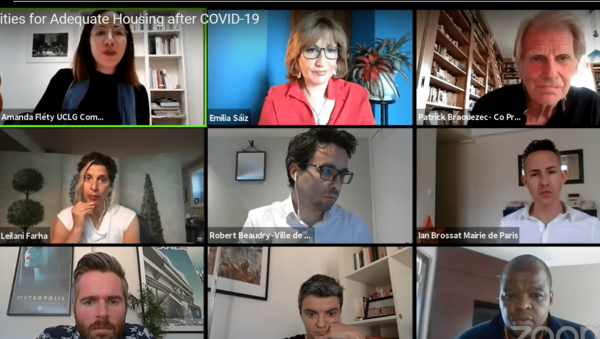UCLG Community of Practice on Housing: Assessing ways to advance the right to housing in the context of the COVID-19 pandemic’s aftermath
The UCLG Community of Practice on Housing meet last May 22 to showcase the latest developments face to COVID-19 by signatory cities of the “Cities for Adequate Housing” Declaration. The meeting offered an opportunity to explore shared challenges and policies put in place these last months, as well as a platform for reflecting on housing’s role in the pandemic aftermath, including ways to assert its social function and advance rights-based strategies. The meeting was held in connection to the #BeyondTheOutbreak series by UCLG (which already held a thematic meeting devoted to this issue last April 1), and was co-organized by the UCLG Committee on Social Inclusion, Participatory Democracy and Human Rights and the City of Barcelona. The recording of the meeting is available here and a more detailed report can be found here.
The meeting gathered as speakers housing representatives from Barcelona (Housing Councillor Lucía Martín), Cape Town (Councilor Xolani Sotashe), Paris (Housing Deputy Mayor Ian Brossat), Rivas Vaciamadrid (Housing Councillor José Luis Alfaro), London (Deputy Mayor for Housing and Residential Development Tom Copley), Montreal (Counselor for Housing, Real Estate Strategy and Public Parks Robert Beaudry) and Valencia (Housing Councillor Isabel Lozano); the interim President of Plaine Commune and co-chair of the UCLG Committee on Social Inclusion, Participatory Democracy and Human Rights (UCLG-CSIPDHR) Patrick Braouezec; the global director of The Shift and former UN Special Rapporteur on the Right to Housing Leilani Farha; as well as UCLG’s Secretary General Emilia Sáiz.
A meeting point for local governments to showcase shared challenges and emerging policies on housing
Local government representatives agreed on identifying housing-related issues as key factors to take into account when addressing the social crisis caused by COVID-19. Many of these factors, however, have only been exacerbated during these last months, having its root causes back before the same pandemic. In the words of Leilani Farha “ the crisis has brought to the forefront challenges that were already an issue before the outbreak, such as homelessness, inability to pay rents, evictions or housing financialization”.
As shown in the session’s report, Cities for Housing priorities have focused on protecting residents at larger risk of housing vulnerability, putting in place emergency solutions to house people who are homeless or help residents pay their rents in case they went through an income drop. Local governments have shown their capacity to rapidly adapt to this new situation and put in place emergency responses even though they had to overcome serious limitations, such as the lack of social housing stock, regulatory capacities or funding. Even though these policies have been put in place under extraordinary circumstances, Cites for Housing now aspire to consolidate them in the coming period, as the crisis has showed clearly the right to housing vital connection and interdependence to other human rights, including the same right to life.
Addressing COVID-19 impacts over local housing systems and boosting city networking on housing #BeyondTheOutbreak
COVID-19 is also triggering other type of transformations that open a window of opportunity to reclaim housing’s social function. As recalled in the session’s report, these include a sudden drop of short rental housing reservations in touristic accommodation platforms, or the transformation of office spaces into housing units. Local governments are eager to find ways to take advantage of this situation while keeping housing adequacy in order to increase affordable housing offer in their cities. Cooperation and knowledge exchange between local governments is deemed as key in this context to help cities identify what works and what don’t.
Reclaiming housing’s social function is only a small part of the larger picture. Indeed, they believe more international coordination could also help raise awareness on housing’s key role in the pandemic’s aftermath. Compelling proposals in this sense were made regarding the need to boost the building of social housing or re-shape the relationship with the real estate market. Local government networking on housing around UCLG, the UCLG-CSIPDHR and the Make the Shift initiative is called to play a major role in helping to bring the right to housing at the centre of global conversation on COVID-19 recovery and sustainable development.
In case you are interested in joining this work or the Cities for Adequate Housing Declaration, reach citiesforhousing@uclg.org

